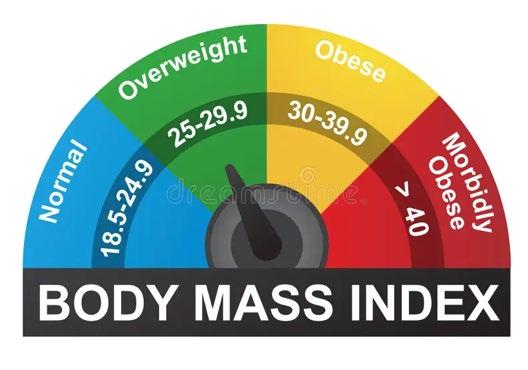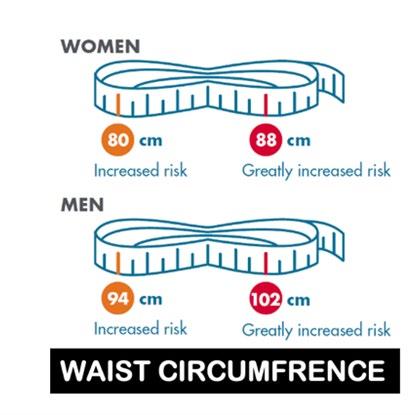
3 minute read
Are We Getting BIGGER?
from DTNOW JUNE 25TH
by dtnow.ng
BY DR IKUNNA ONWUANIBE

Advertisement
The whole world is getting fatter, Nigeria and the rest of Africa included. About one in five people in Nigeria are overweight or obese. Being overweight or obese increases the risk of several illnesses: heart disease, cancer, and diabetes. We may recall that being overweight or obese also increased the risk of death during the COVID-19 pandemic.
Everyone needs some body fat to stay healthy. There are two types of fat: subcutaneous fat found under the skin and visceral fat found around our internal organs like the liver. Visceral fat is not great for health. People who carry excess weight in the middle (around the belly button) have more visceral fat and are therefore most at risk of health problems than those who carry weight around the hips. Everyone need to act now, because of the risk of living in poor health and living a shorter life from being overweight or obese.
WHAT ARE THE CAUSES OF WEIGHT GAIN?
There are several causes of weight gain: food portion size, fat and sugar content of food, sugar content of drinks, genes, and physical inactivity. Researchers from the Warwick Medical School in the United Kingdom concluded that in Nigeria, overweight or obese people were more likely to be wealthy and highly educated, and more likely to live in urban areas. They also found that women were more likely to be overweight or obese than men, in Nigeria: this may be because men are more likely to undertake physical work.
There has been a drastic change in lifestyle in Nigeria. Western influences on diet and lifestyle, and urbanisation have brought changes in lifestyle and diet, which has led to an increase in the number of obese and overweight people in Nigeria. The increasing number of restaurants and fast-food outlets has led to increased consumption of over processed and high fat content food. This has contributed to the increase in the average body size in Nigeria. Urbanisation, as people move from village to cities, has made people more sedentary as they take up desk jobs and less manual jobs. More people have cars and drive where they might have walked in the past. Also, the work patterns have changed because of the pandemic, with more people currently working from home, which is likely to increase physical inactivity and binge eating.
HOW TO MEASURE OBESITY?
There are two ways of measuring obesity. The most common measurement is Body Mass Index (BMI). BMI is calculated with the weight in kilograms and height in metres. The main limitation is that BMI overestimates body fat in people who are muscular, which can be an issue in Africans. A BMI of 25 to 29.9 is classified as overweight and BMI of over 30 is classified as obese. Most Nigerians would probably think of people who fall into the overweight category (BMI of 25-29.9) as normal.
Another useful measurement is the waist size. This is used to determine if there is too much fat in the middle of the body, as a large waist measurement means more visceral fat and the associated with health risks. This waist measurement is different from the conventional waist size used for shopping for clothes. The waist circumference is usually just above the belly button, about halfway between the bottom of the ribs and the top of the hips. Health risks increase as waist size increases, regardless of BMI.

HOW CAN ONE MANAGE WEIGHT?
Weight management is difficult. Managing weight is not about giving up a lot of things, but rather about making healthier lifestyle choices by being more physically active and making healthier food choices. The benefits of these choices have additional advantages: people are better able to manage their emotions, sleep better, have more energy and a better sex life.
The weight maths must add up. If one regularly consumes more calories than they use, the body will store the calories as body fat, and the BMI will increase. To manage weight, one must pay attention to how and what is consumed. Scientific research suggests that slow eaters are less likely to be overweight that speedy eaters. The Japanese, who are one of thinnest in the world, stop eating when they are 80% full. This is important because it takes time for the stomach to send messages to the brain to say it is full.
The recommendation is to engage in physical activity for about 150 minutes each week, spread out over 5 days. One must also look at ways to incorporate physical activity into daily activities. Workplaces should encourage workers to use stairs instead of lifts. The overall aim is to do something, no matter how little, as this increases the likelihood of remaining in good health.
Top Tips for Weight Management
• Use smaller plates.
• Cut portion size.
• Eat slowly, chew more.
• Set down cutlery between bites.
• Stop when 80% full.
Bottom line
Obesity is not just a western societal problem; it is also a growing problem in Nigeria. Lifestyles choices must be made today to stop one from getting fatter.
Dr Ikunna Onwuanibe Family Physician at Dennis Ashley Medical Clinic Landmark Towers, Oniru, VI, Lagos @ikupopsicles
Ikunna has over 25 years of experience in family medicine and holds a master's degree in public health from the London School of Hygiene and Tropical Medicine. Her main interests are women’s health and the prevention of long-term illnesses.








